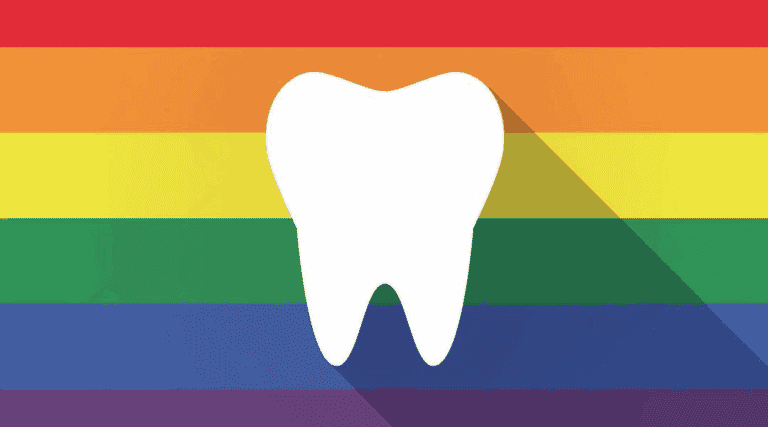Dental Clinics and Dentists have a duty to create a safe and inclusive environment where all patients can disclose information that may be relevant for their healthcare and treatment.
Patients may not be aware of how their sexual orientation, gender identity, trans status or any other protected characteristic can affect their oral health. For this reason, dentists may use new patient communication tools like brochures, posters and leaflets to raise awareness of oral risk factors such as smoking, eating disorders etc.
LGBT communities include people of different genders and sexual orientations and come from all backgrounds. Some patients who identify as LGBT may have complex health needs and may not feel comfortable volunteering information about their sexual orientation, gender identity and trans status without first having trust and confidence in their dentist.
Having inclusive posters, using gender-neutral language (e.g. partner rather than wife/husband) and using a patient’s preferred pronoun are all simple things to demonstrate inclusivity. A dentist who knows that a patient is LGBT is better informed about the person who is sat in the dental chair.
Knowing a patient’s sexual orientation or gender identity means staff are less likely to make assumptions or can ask appropriate questions to establish possible health risks and relevant signposting or referral pathways.
In essence knowing how a patient identifies can be pivotal in providing patient-centered care and identifying early risk factors for conditions such as mouth cancer, HIV etc.
Why do the dental team need to know about my LGBT identity?
The dentist will need to know your medical history and any medicines that you are taking. This includes any regularly prescribed medicines from your GP or other health provider (such as HIV medications and Hormone Replacement Therapy).
However, it is important that dental teams do not make assumptions about their patients who are LGBT; not all gay men will be at higher risk of acquiring HIV or; just because someone identifies as trans does not mean that they are taking hormones.
To prevent assumptions, dental staff may ask open questions in consultation or ask questions on new patient forms to collect relevant data. It is also helpful if the dental team know about any concerns or anxieties you may have, so that they can help to make you feel at ease.
Dentists are not there to judge or criticize you but to help improve your oral health and answer any questions or concerns you may have about your mouth, teeth and gums.
How might identifying as LGBT affect someone’s oral health?
Within society LGBT people have faced discrimination in all areas of life. Some examples include homophobic, biphobic or transphobic behaviour or attitudes to lack of understanding within healthcare regarding the specific health needs of LGBT people.
This lack of knowledge may become prevalent when services are exclusively designed towards heterosexual people and those who identify with the gender they were assigned at birth.
Research shows LGBT people experience a number of health inequalities including lack of access to services and increased risk of substance use relating to minority stress. As an LGBT patient it is important that you feel able to trust your dentist as there may be some specific health factors that particularly affect you that your dentist needs to be aware of. For example:
- LGBT people are more likely to smoke and smokers are more likely to get oral infections than non-smokers. Other issues, such as mental health, substance use, and eating disorders, can all affect your oral health.
- LGBT people are affected by higher rates of HIV and hepatitis; this can be linked to sexual activity and substance abuse. HIV can decrease the body’s ability to fight infection and side effects of some HIV meds can cause problems in the mouth.
- Some trans people may self-medicate with hormones bought online and some HRT medication can produce oral health problems so it is important that trans patients feel able to discuss any potential oral health issues with their dentist.
A dentist who knows that a patient is LGBT is better informed to be able to look out for any health issues that may affect your oral health.
How do I choose a dentist that is right for me?
The dentist’s job is to give patients a regular checkup and make sure your teeth and gums are healthy. If you do not feel comfortable visiting the dentist, or if you don’t have regular visits to the dentist, then you may be storing up problems for the future. Things to remember when accessing dental services:

- You are in a safe place where, if you choose, you can disclose information about your trans status, gender and sexual orientation.
- Assumptions will not be made about you simply because you are LGBT.
- Information about you will be treated confidentially and you will not lose control over what other people know about you.
- You will be treated with respect, and in particular without discrimination or judgement.
You can ask your dental practice questions about their awareness of LGBT patients’ needs. If you have a particular health condition, you can also check they are knowledgeable about how this may affect your oral health.
All dental professionals have to demonstrate that they understand the needs of individual patients. If you find that this is not your experience then you have the right to speak to the practice manager of the practice or to make a formal complaint through the practice’s complaints policy.










